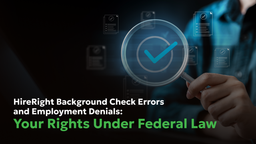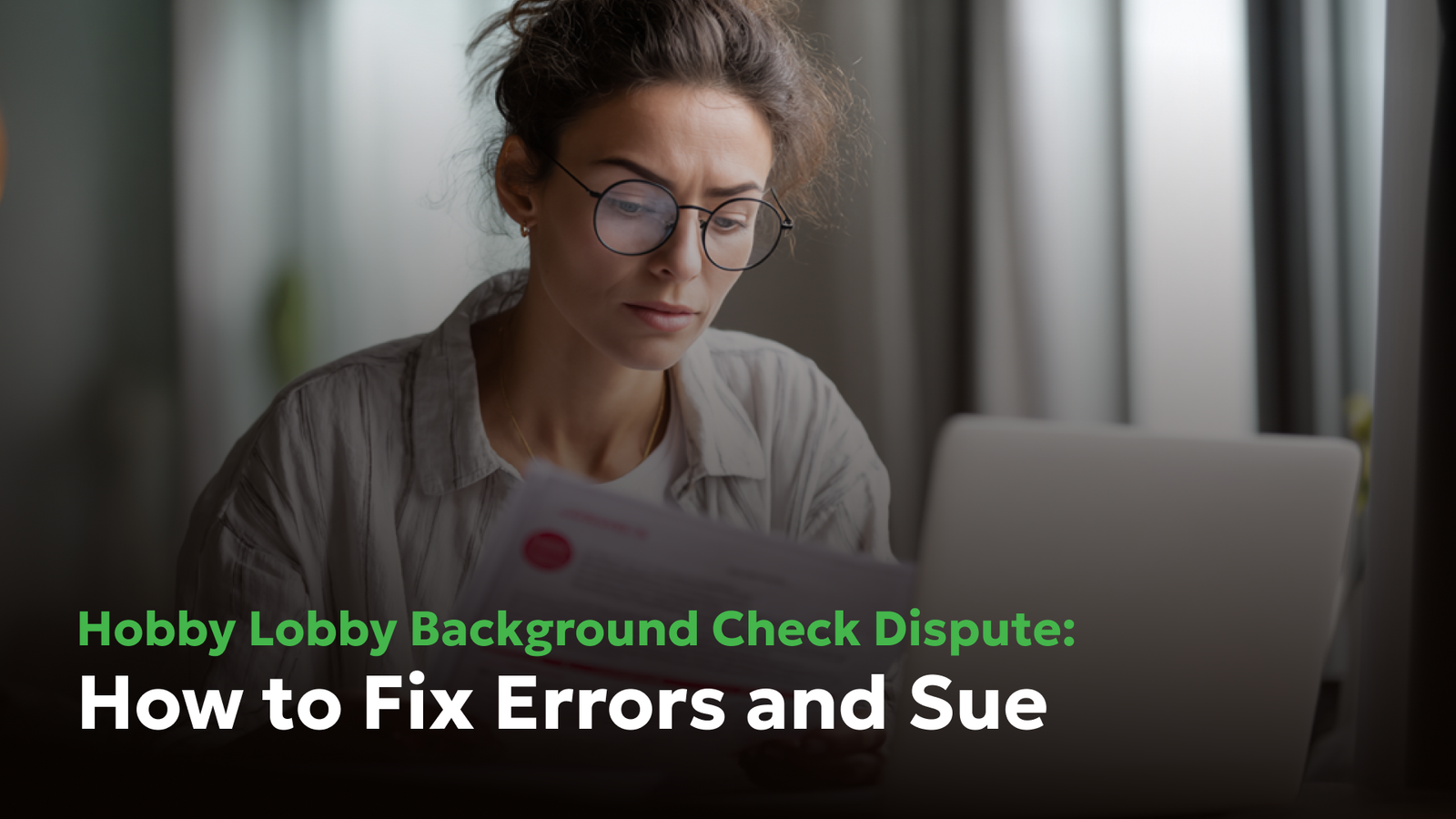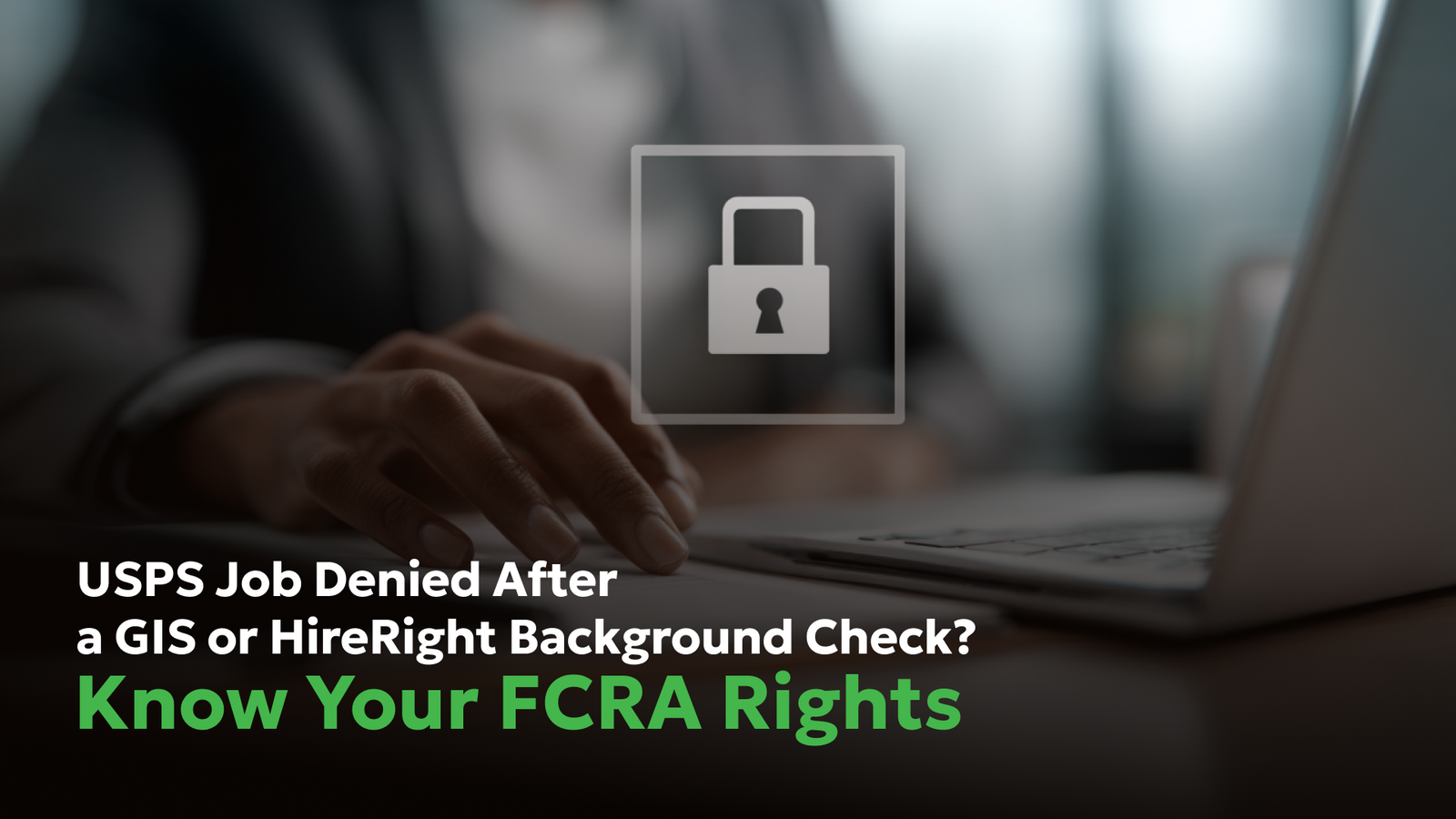TransUnion Background Check Mistakes: How to fix them?
- Blog
- Employment Background Check Errors
TransUnion Background Check Mistakes: How to fix them?

If Errors in Your TransUnion Background Check Report Got You Rejected From a Rental or Job, We Can Help!
Did you lose out on a job or rental opportunity due to TransUnion's errors? If you failed a TransUnion background check due to inaccurate, misleading, or false information, know what to do next! We explain how data mistakes happen, why they matter, how to fix them, and how to get compensation for the financial and emotional harm they cause.
If you have already had to submit to a TransUnion tenant background check or TransUnion background check for employment, or you are expected to submit to one soon, then you are well aware that these services are a regular part of life for the modern consumer. When things go right, the process is uncomplicated, and approval of your application moves forward seamlessly. But when things go wrong, it can quickly turn into a financial or emotional nightmare. This is especially true if you end up being rejected from a job or housing opportunity due to errors in your TransUnion background check.
TransUnion is not the only company performing background checks. In fact, it is one of many in a field of competitors. But if you need to know as much as you can specifically about TransUnion background checks, you’re in the right place.
At Consumer Attorneys, our team of consumer law lawyers has been helping clients recover from unjust and unfair reporting errors for years. We have seen, heard, and handled it all. I’ll explain what TransUnion is, why and how it conducts background checks, how errors and mistakes make their way into these reports, how to dispute and correct these errors, what your legal rights are, how to make TransUnion do the right thing if you hit a roadblock, and how to get compensation for any harm you suffer as a result. First, keep reading. Then, call today!
About TransUnion Company
As one of the largest consumer data companies in the world, TransUnion (TU) offers credit reporting and backcheck services to a global client base. It provides services (targeted data retrieval and review) and products (credit or background reports) to employers, small businesses, landlords, and property management companies.
TransUnion operates using various software and online platforms to conduct its background checks, so you may encounter the names SmartMove, ShareAble For Hires, TruVision, or others. These are all names associated with various aspects or options related to TransUnion’s background check products and services.
TransUnion is a Consumer Reporting Agency
You are likely most familiar with TransUnion due to its status as one of the credit bureaus, along with Experian and Equifax. Though the moniker “credit bureau” sounds official, TransUnion is a company, not a government or government-affiliated entity. The credit bureaus are actually just the three largest and most frequently used consumer reporting agencies (CRAs).
CRA is a category of company defined by federal legislators under the Fair Credit Reporting Act (FCRA) that is subject to federal regulation. CRAs buy and sell consumer data for profit. When a company like TransUnion puts together a consumer report (credit or background check), it sells that report for profit.
CRAs buy consumer data from companies defined as “data furnishers” under the FCRA. Data furnishers are typically the companies that you have a direct relationship with, like credit card companies, banks, home and auto lenders, service providers, and similar. They also buy data from third-party companies that scan and gather information from public databases like federal, state, county, criminal, and municipal databases.
Under the FCRA, CRAs are required to implement measures and protocols necessary to ensure accuracy in their reporting. Compliance with the regulations set forth under the FCRA is enforced through lawsuits, if necessary.
How Does TransUnion Conduct Background Checks?
TransUnion and other CRAs use algorithms (computer programs) to run checks on people through a process of data gathering, sorting, and review that emphasizes speed and efficiency. Data reporting errors come into play when the massive volume of data scoured, along with the need for speed, bumps up against insufficient review and refinement protocols that are meant to protect consumers by ensuring accuracy.
- First, understand that your tentative employer or property manager is TransUnion’s client. They will provide you with login credentials to access TransUnion’s online platform to complete the background check. You will consent to the screening and provide all required information and documentation.
- Second, TransUnion’s algorithms get to work scouring the data-verse for your information. When there are “hits” or matches of data that the algorithm believes belongs to you, it gathers and compiles it into a report using pre-programmed formatting.
- This report then gets sent to the employer or property manager who requested it, and the data it contains is used to make decisions about your candidacy as an employee or tenant. In other words, TransUnion will use the information to determine whether to hire, fire, or rent to you.
- You should also expect to receive a copy of the report upon completion. You may have to select this option at the outset of the process. Regardless, you have the right to receive and review the completed report and can request one if you don’t automatically receive it.
How Long Does a Background Check from TransUnion Take?
TransUnion states that its employment and rental background screenings are completed within minutes. Of course, there are exceptions to this estimated turnaround time. But most reports are completed and made available quickly. Any candidate requiring more discerning review may find that their background check is processed more slowly. For instance, screening a candidate with a very common first and last name may require a greater degree of scrutiny to ensure data accuracy, which can slow the process.
What Information Does TransUnion Provide in a Background Check?
The information provided in a TransUnion background check varies depending on its purpose. For instance, a pre-employment background check includes and excludes categories of information that are different from those included or excluded for a TransUnion rental screening. In addition, even within these two broad categories, there are customizable choices or package options that offer the inclusion of varying levels of inquiry. Regardless, the reports will include a listing of information identified by category or type.
TransUnion Criminal Background Check
A TransUnion criminal background check can include county, state, and multi-state data, most-wanted databases, the National Sex Offender Registry, and federal or global watchlists. Whether generated for pre-employment or rental purposes, the criminal background check allows TransUnion clients to safely navigate candidate or applicant choices in a way that ensures maximum security for the other employees or tenants.
State law plays a significant role in dictating look-back periods for the reporting of various criminal infractions. The criteria for inclusion of certain types of crimes may vary as well. This is one of the reasons why working with a consumer protection lawyer is a good idea. They can serve as a critical checkpoint in knowing what the full scope of your rights are under applicable federal and state law.
TransUnion Background Checks for Rental Property
TransUnion’s rental screenings generally include a Resident Score, credit history, eviction history, income information, criminal history, identity verification, and sex offender data.
The Resident Score uses a proprietary formula to transform an applicant’s credit history and credit score into a numerical value. Scaled similarly to a credit score, a TransUnion Resident Score ranges from 350-850 and draws on data from 500,000 resident-specific records. Such things as evictions, late payments, and broken lease obligations are part of the formula that factors into producing the Resident Score.
TransUnion Background Check for Employment
Among the categories of information included in a TransUnion employment screening are state and county records, criminal history, federal watchlists, national sex offender and most wanted status, fraud alerts, credit history, social trace (using SSN for identity verification and check against the Social Security Administration’s Death Master File), employment and address verification, and TransUnion proprietary categories such as TransUnion Instant Match. These types of screenings balance criteria of eligibility, transparency, and security toward the ultimate objective of success in the position.
In addition, employment background checks can take place as part of the pre-employment hiring process or as part of an ongoing monitoring protocol for current employees.
What Are Your Rights Regarding a Background Check?
Under the Fair Credit Reporting Act (FCRA), along with other federal and state legislation, consumers have several key rights when it comes to reporting, disputing, and correcting their data. These rights, along with TransUnion’s obligations, strive to create an atmosphere of accountability in the consumer data industry.
To really know your rights under the federal and state laws relevant to where you live, talk to a consumer protection lawyer like those on our team at Consumer Attorneys. Discrepancies among state laws can directly impact your rights. For now, the general framework of your rights when it comes to background checks consists of the following:
- Consent. Regardless of who your prospective employer or landlord is, a background check cannot be run on you without your express consent.
- Accuracy. You have the right to accurate information. CRAs like TransUnion are legally obligated to meet a legal standard of accuracy when generating these reports.
- Review. You have the right to review any consumer report run on you, including TransUnion background employment background checks and tenant screenings. You may be able to select to receive a copy automatically, but even if you don’t, you are entitled by law to request a copy.
- Informed Rejection. If you fail a TransUnion background check and are denied housing or employment as a result, you have a right to know which specific information in the report was relied on as the grounds for denying you the opportunity in question.
- Free Credit Review. Once per week, you have the right to review your credit report from each of the three credit bureaus without any out-of-pocket cost. If your TransUnion background check includes errors, we recommend requesting and reviewing all three credit reports to help determine the extent of these errors.
There are three ways to request a copy: online at annualcreditreport.com, by phone at 877-322-8228, or by mailing a request form, which can be printed at annualcreditreport.com. Online requests should only be made through the above government-verified site. - Dispute. You have the right to dispute and seek error correction for any inaccurate, misleading, or false information in your background check. In addition, because certain state laws dictate what types of information can be included in a background check or what the look-back period is for certain types of information, it is even possible for accurate information to violate reporting laws and constitute a reporting error. When information that is deemed “not reportable” is reported, then this is an error and can be disputed.
Regardless of which TransUnion platform is used for your background check, TransUnion must provide a dispute procedure. See below for more information about how to dispute errors. - File a lawsuit. You have a right to file a lawsuit seeking error correction and compensation for any background check reporting mistakes that cause you harm. This includes financial, emotional, reputational, or other harm.
In addition, for certain reporting mistakes, you do not have to prove harm in order to seek compensation. For instance, you can sue for being mistakenly reported as deceased or for willful reporting errors, exclusive of meeting the burden of demonstrable harm. - Covered legal fees. You have the right to legal protection without accruing out-of-pocket costs. TransUnion must pay for your legal fees and costs if you win a lawsuit against it for reporting violations under the FCRA.
At Consumer Attorneys, our initial legal consultations are free as well. So, if you call or contact us to set up an initial consultation, you won’t pay anything out-of-pocket.
Which Companies Use TransUnion for Background Checks?
Because TransUnion is one of the largest consumer data companies in the world and has so many separate entities and subsidiaries operating various offshoots of its consumer reporting business, it is not possible to identify the full scope of companies, small businesses, landlords, property management companies, and other entities that rely on TransUnion background checks.
What do Companies Use TransUnion Background Checks For?
TransUnion’s clients, or the companies that use TransUnion background checks, rely on these screenings as tools for vetting potential tenants and employees for possible financial, safety, behavior, or misconduct issues.
- Renters: For prospective tenants, background checks are meant to identify applicants who are most likely to successfully complete the terms of a lease. This includes being able to make timely and adequate payments. It is also meant to identify any applicant with a disqualifying criminal or eviction history.
- Employees: For job candidates, background checks are typically meant to verify prior employment and educational history, assess a candidate's credit profile, screen for security issues (if applicable), and identify candidates with a disqualifying criminal history.
Can Errors Occur in Background Checks from TransUnion?
Yes, errors can occur in background checks from TransUnion, and they do. TransUnion is simply one piece in the giant consumer data web, and the industry is rife with reporting errors. Recent research determined that approximately one-third of people have discovered errors in a consumer report at some point in their lives.
Granted, most TransUnion background checks, whether employment or housing-related, are accurate. But the sheer volume of data, candidates, and screenings being run daily means that even if a relatively small percentage of consumers are impacted by reporting errors, that percentage still represents thousands of people annually.
Other TransUnion Errors
Not only can errors show up in TransUnion employment and housing-related background check reports, but they can also show up in any of the other consumer data products that TransUnion sells. For instance, inaccurate, misleading, and false information about hard credit inquiries can show up in credit reports, or your credit report is showing “deceased” by Transunion. Our lawyers have handled all of these types of errors. So, if you need to know how to remove hard inquiries from TransUnion credit reports or any other data reporting problem, we’re here to help.
Other Background Check Companies
TransUnion is just one of many CRAs that provide background check services of all kinds. If you have experienced the trauma of data errors from reports generated by other companies, such as Inflection Risk Solutions, we are poised and ready to help.
What Causes Errors in Background Checks?
Errors in background checks are just data errors. Ultimately, data errors happen because TransUnion and other CRAs use algorithms to search for, gather, review, and catalog data pertaining to a particular person. These algorithms may be too broad, unrefined, and lack the ability to recognize or sift out irrelevant or erroneous data. This is worsened by the volume of data, along with an emphasis on speed and profit.
Some common sources of data errors include:
- Input or data entry errors: When data is entered into a system, usually at the data furnisher level, it can be inadvertently entered incorrectly. This creates inaccurate, misleading, or false “facts” about a consumer that may be easily identified by a human using context clues and logic but are not easily identified by algorithms using programming.
- Mixed or Co-Mingled Files: These types of errors happen when data from two different people is co-mingled into a single file. This typically happens because of superficial similarities, like a shared name, birth date, or similar. However, it can also happen because two consumers are, or were at one time, affiliated through a shared account.
It can also result from even less obvious connections, like a shared middle name or a similar but different first or last name. It is also not unheard of to have data from persons of the opposite sex co-mingled. Again, these are the types of errors that a human would likely be able to catch but that algorithms sometimes fail to. - Identity theft and identity fraud: Identity theft is the unauthorized access to someone else’s identity, and identity fraud is the use of that identity to engage in unauthorized activities. These prevalent and persistent crimes can cause all kinds of data disruptions and generate an abundance of inaccurate information that appears to reflect authorization for financial activities, though there was none. This is one of the reasons it is always a good idea to use privacy and security software and best practices to help prevent it from occurring in the first place.
If you are the victim of identity theft and identity fraud, you still have rights under the FCRA and under other important federal and state legislation. Cleaning up errors caused by one of these crimes can be complicated and involve authentication processes, but we can help you navigate the legal landscape.
Main Types of Errors
Regardless of the cause, some of the main types of errors that you’re likely to encounter in a TransUnion background check are:
- Transposition of digits in a Social Security Number or date
- Wrong or incomplete information in original documents
- Incorrect criminal records (e.g., misleading, inaccurate, false, or unreportable data)
- Outdated information (e.g., expunged convictions that were not updated)
- Mistaken identity resulting in unaffiliated criminal records being associated with the wrong person
- Information from identity theft and fraud scenarios that are reported as accurate.
- Information from someone else in your consumer profile (including criminal, credit, financial, employment, housing, etc.).
How Often Do Errors Occur in Background Checks from TransUnion
There is no public data available specifically regarding errors in TransUnion employment and housing-related background checks, but approximately one-third of American consumers are impacted by credit errors during their lifetime.
What are the Consequences of Having Errors in Your Background Check Report?
The consequences of having errors in your background check can be significant. Rental applicants who were looking for short-term guest rentals may have rental plans canceled or face prohibition from future rental opportunities. Long-term renters may lose out on immediate housing options or face housing insecurity. Job applicants may lose out on immediate job opportunities and could potentially suffer more far-reaching consequences like financial problems stemming from insufficient income. The latter can also lead to delinquent bills or rental payments and other issues. Employees subject to ongoing background screenings may face suspension or termination.
Also, depending on the nature of the error in the background check, it could follow you to other job or housing prospects, causing application cancellations or reputational harm. This is why successful adjudication of these errors is critical.
You Can Contact TransUnion if You Need to Correct an Error in the Background Report
TransUnion’s website, along with the various background check platforms that it operates under different names (like SmartMove, Shareable for Hires, etc.), should provide information about the stated policy for how to dispute (or appeal) errors in your background check.
How to Dispute Errors
To dispute errors in your TransUnion background check report, you will:
- Contact a consumer protection lawyer. A lawyer will help you understand your rights, TransUnion’s legal obligations, and how to protect yourself through the process, including what to do if things don’t resolve smoothly.
- Review your report. Carefully review and mark all inaccurate, misleading, false, or unreportable information. As the only reviewer who knows whether any specific piece of data is correct, it is critical to be detailed, methodical, and thorough.
- Dispute errors. Follow the guidelines provided by TransUnion to dispute errors in your background check. However, please note that we advise against using TransUnion online dispute platforms to file disputes and provide documentation. To use such platforms, you frequently have to waive the right to file a lawsuit over the dispute in question. This is not advisable. Rather, we recommend filing the dispute and providing all required documentation via certified mail.
- Provide documentation. Provide requested documentation via certified mail, sending only copies of documents, not originals.
- Review your credit reports. We recommend reviewing your credit report from each of the credit bureaus to conduct an assessment of the extent of any reporting errors. (See above for how to get copies of your credit reports.)
- Contact a consumer protection lawyer and file a lawsuit if necessary. In data error disputes, stalls, delays, and deadends are frequent. If you haven’t already done so, contact a background check lawyer today, like those at Consumer Attorneys.
Though not a part of the formal dispute process, you may also choose to appeal the adverse decision made by your prospective employer, landlord, or property manager who acted in reliance on the erroneous information. These appeals are not always fruitful, but some employers and landlords are receptive to the knowledge that the information in the background check is incorrect and is currently being formally disputed with TransUnion.
Note that an employer, landlord, or property manager does not have any obligation or responsibility to reconsider the decision or offer reinstatement since the decision was made in good faith based on the information provided in the report.
What to Do if You Do Not Receive Answers to Your Questions On the Background Report
After you’ve filed a dispute, TransUnion will have 30 days in which to respond, letting you know the outcome of its investigation. There are some exceptions that may extend this time to 45 days, but if you haven’t received notice from them within 30, contact a consumer protection lawyer.
Similarly, if TransUnion responds by informing you that its reinvestigation of the data confirmed that the data, as reported, is correct, you should contact a consumer protection lawyer. Unfortunately, this happens more frequently than you might imagine.
You Can Sue TransUnion if Your Report Contains Errors
Under the FCRA, you have the right to sue TransUnion for reporting inaccurate, misleading, or false information in your background check. Generally, you will have to show that you have been harmed in some way, either financially or emotionally. However, there are also certain types of errors that do not require you to show harm.
So, if TransUnion has generated a consumer report about you that contains errors, it is worth having a consultation with a lawyer like those on our team at Consumer Attorneys.
Who Can You Contact to Solve the Problem With an Error in the Background Report from TransUnion?
Contact the top-tier team of attorneys at Consumer Attorneys. We are a nationwide law firm of skilled, experienced, and knowledgeable consumer protection lawyers with over seventy-five years of combined experience. We have helped thousands of people recover from data reporting errors, and we are here to help you, too.
Assistance in Disputing a TransUnion Background Report
The lawyers at Consumer Attorneys know the nuances and hurdles involved with disputing background reporting errors and can help you from the first step to the final resolution of your dispute.
Lawsuits Against TransUnion (TU)
At Consumer Attorneys, our lawyers have successfully sued TransUnion for inaccurate, misleading, false, or unreportable information in employment and rental background checks and helped our clients make a full recovery. This story of our client Sharon is just one example.
Misleading Eviction History
When our client, Sharon, applied for a rental, she was shocked to learn she’d been denied due to a prior “forcible detainer action” (aka, an eviction). Her TURSS rental screening report indicated that the action had been filed, but it failed to indicate that it had also quickly been dismissed. Sharon hadn’t even known about the action, nor had she ever been evicted from any residence. In fact, she and her husband lived at the address implicated in the forcible detainer action for two years past the date on which it was filed. Notably, her husband’s TURSS rental screening did not list the “forcible detainer action.”
We successfully argued that by reporting such misleading information in Sharon’s rental screening, TURSS failed to use “reasonable procedures to assure maximum possible accuracy,” as the law requires. A basic review of the data would have clearly picked up on the fact that the action was dismissed, Sharon was never notified or evicted, she lived at the residence for years past the date of the filing, and her husband’s rental screening was clear of evictions. We won compensation, justice, and peace of mind for Sharon and her husband.
Ask for Our Help Now with a Free Consultation
At Consumer Attorneys, our nationwide team of experienced and knowledgeable lawyers aren’t just consumer protection litigators, we are also consumer advocates. We fight for your rights even when we aren’t in the courtroom. With over seventy-five years of combined experience, you can trust our lawyers to help you get back to good.
When you call to discuss your TransUnion background check dispute with one of our lawyers, the initial consultation is always free. We don’t charge anything to hear what you have to say and to decide if we can help you recover from the financial and emotional harm of TransUnion reporting errors.
If we take your case and win a lawsuit against TransUnion, you pay nothing out-of-pocket because the Fair Credit Reporting Act makes TransUnion pay for your lawyer’s fees and costs.
With no out-of-pocket cost to you, there is nothing to lose in discussing your TransUnion reporting error with one of our skilled consumer protection lawyers today. We work in jurisdictions nationwide.
There are several ways to reach us: call +1 877-615-1725, email info@consumerattorneys.com, fill out the online intake form, or use the virtual chat option to speak with us today.
From coast to coast, we’re always right where you need us to be. Call today!


Daniel Cohen is the Founder of Consumer Attorneys. Daniel manages the firm’s branding, marketing, client intake and business development efforts. Since 2017, he is a member of the National Association of Consumer Advocates and the National Consumer Law Center. Mr. Cohen is a nationally-recognized practitioner of consumer protection law. He has a we... Read more





Related Articles




R
ONGS™You pay nothing. The law makes them pay.


